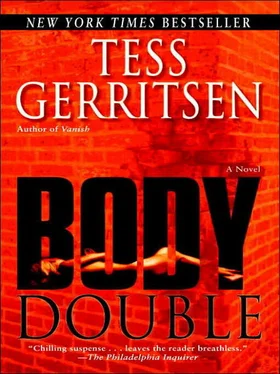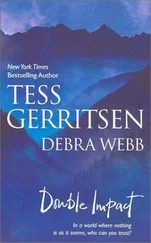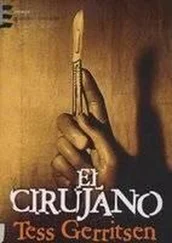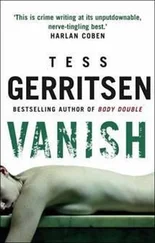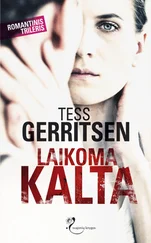She asked, in a voice that struck her as unnaturally calm, “Have you learned anything else about her?”
“We’re still checking on that name, Anna Jessop,” said Rizzoli. “All we have so far is that Massachusetts driver’s license, issued four months ago. It says she’s forty years old. Five foot seven, black hair, green eyes. A hundred twenty pounds.” Rizzoli eyed the corpse on the table. “I’d say she fits that description.”
So do I, thought Maura. I’m forty years old and five foot seven. Only the weight is different; I weigh a hundred twenty-five. But what woman doesn’t lie about her weight on her driver’s license?
She watched, wordless, as Abe completed his surface exam. He jotted occasional notations on the preprinted diagram of a female body. Bullet wound in the left temple. Dependent mottling of the lower torso and thighs. Appendectomy scar. Then he set down the clipboard and moved to the foot of the table to collect vaginal swabs. As he and Yoshima rotated the thighs to expose the perineum, it was the corpse’s abdomen that Maura focused on. She stared at the appendectomy scar, a thin white line tracing across ivory skin.
I have one, too.
Swabs collected, Abe moved to the instrument tray and picked up the scalpel.
The first cut was almost unbearable to watch. Maura actually lifted her hand to her chest, as though she could feel the blade slice into her own flesh. This was a mistake, she thought as Abe made his Y incision. I don’t know if I can watch this. But she remained rooted to her spot, trapped by appalled fascination as she saw Abe reflect back the skin from the chest wall, swiftly peeling it away as though skinning game. He worked unaware of her horror, his attention focused only on the task of opening up the torso. An efficient pathologist can complete an uncomplicated autopsy in under an hour, and at this stage of the postmortem, Abe wasted no time on needlessly elegant dissection. Maura had always thought Abe a likable man, with his hearty appetite for food and drink and opera, but at this moment, with his bulging abdomen and his neck thick as a bull’s, he looked like a fat butcher, his knife tearing through flesh.
The skin of the chest was now flayed open, the breasts concealed beneath the peeled-back flaps, the ribs and muscles exposed. Yoshima leaned forward with pruning shears and cut through the ribs. Each snap made Maura wince. How easily a human bone is cracked, she thought. We think of our hearts as protected within a sturdy cage of ribs, yet all it takes is the squeeze of a handle, the scissoring of blades, and one by one, the ribs surrender to tempered steel. We are made of such fragile material.
Yoshima snipped through the last bone, and Abe sliced the last strands of gristle and muscle. Together they removed the breastplate, as though lifting off the lid of a box.
Inside the open thorax, the heart and lungs glistened. Young organs, was Maura’s first thought. But no, she realized; forty years old wasn’t so young, was it? It was not easy to acknowledge that, at age forty, she was at the halfway mark in her life. That she, like this woman on the table, could no longer be considered young.
The organs she saw in the open chest appeared normal, without obvious signs of pathology. With a few swift cuts, Abe excised the lungs and heart and placed them in a metal basin. Under bright lights he made a few slices to view the lung parenchyma.
“Not a smoker,” he said to the two detectives. “No edema. Nice healthy tissue.”
Except for the fact it was dead.
He dropped the lungs back into the basin, where they formed a pink mound, and he picked up the heart. It rested easily in his massive hand. Maura was suddenly aware of her own heart, thumping in her chest. Like this woman’s heart, it would fit in Abe’s palm. She felt a twinge of nausea at the thought of him holding it, turning it over to inspect the coronary vessels as he was doing now. Though mechanically just a pump, the heart sits at the very core of one’s body, and to see this one so exposed to view made her own chest feel hollow. She took a breath, and the scent of blood made her nausea worse. She turned away from the corpse and found herself meeting Rizzoli’s gaze. Rizzoli, who saw too much. They had known each other almost two years now, had worked enough cases together to have developed the highest regard for each other as professionals. But along with that regard came a measure of respectful wariness. Maura knew just how acute were Rizzoli’s instincts, and as they looked at each other across the table, she knew that the other woman must surely see how close Maura was to bolting from the room. At the unspoken question in Rizzoli’s eyes, Maura simply squared her jaw. The Queen of the Dead reasserted her invincibility.
She focused, once again, on the corpse.
Abe, oblivious to the undercurrent of tension in the room, had sliced open the heart’s chambers. “Valves all look normal,” he commented. “Coronaries are soft. Clean vessels. Geez, I hope my heart looks this good.”
Maura glanced at his enormous belly and doubted it, knowing his passion for foie gras and buttery sauces. Enjoy life while you can, was Abe’s philosophy. Indulge your appetites now, because we all end up, sooner or later, like our friends on the table. What good are clean coronaries if you’ve lived a life deprived of pleasures?
He set the heart in the basin and went to work on the contents of the abdomen, his scalpel slicing deep, through peritoneum. Out came the stomach and liver, spleen and pancreas. The odor of death, of chilled organs, was familiar to Maura, yet this time so disturbing. As if she was experiencing an autopsy for the very first time. No longer the jaded pathologist, she watched Abe cut with scissors and knife, and the brutality of the procedure appalled her. Dear god, this is what I do every day, but when my scalpel cuts, it’s through the unfamiliar flesh of strangers.
This woman does not feel like a stranger.
She slipped into a numb void, watching Abe work as though from a distance. Fatigued by her restless night, by jet lag, she felt herself recede from the scene unfolding on the table, retreating to some safer vantage point from which she could watch with dulled emotions. It was just a cadaver on the table. No connection, no one she knew. Abe quickly freed the small intestines and dropped the coils into the basin. With scissors and kitchen knife, he gutted the abdomen, leaving only a hollow shell. He carried the basin, now heavy with entrails, to the stainless steel countertop, where he lifted out the organs one by one for closer examination.
On the cutting board, he slit open the stomach and drained the contents into a smaller basin. The smell of undigested food made Rizzoli and Frost turn away, their faces grimacing in disgust.
“Looks like the remains of supper here,” said Abe. “I’d say she had a seafood salad. I see lettuce and tomatoes. Maybe shrimp…”
“How close to the time of death was her last meal?” asked Rizzoli. Voice oddly nasal, her hand over her face, blocking the smells.
“An hour, maybe more. I’m guessing she ate out, since seafood salad’s not the kind of meal I’d fix for myself at home.” Abe glanced at Rizzoli. “You find any restaurant receipts in her purse?”
“No. She could’ve paid cash. We’re still waiting for her credit card info.”
“Jesus,” said Frost, still averting his gaze. “This just about kills any appetite I ever had for shrimp.”
“Hey, you can’t let that bother you,” said Abe, now slicing into the pancreas. “When you get right down to it, we’re all made up of the same basic building blocks. Fat, carbohydrates, and protein. You eat a juicy steak, you’re eating muscle. You think I’d ever swear off steak, just because that’s the tissue I dissect every day? All muscle has the same biochemical ingredients, but sometimes it just smells better than at other times.” He reached for the kidneys. Made neat slices into each, and dropped small tissue samples into a jar of formalin. “So far, everything looks normal,” he said. He glanced at Maura. “You agree?”
Читать дальше
